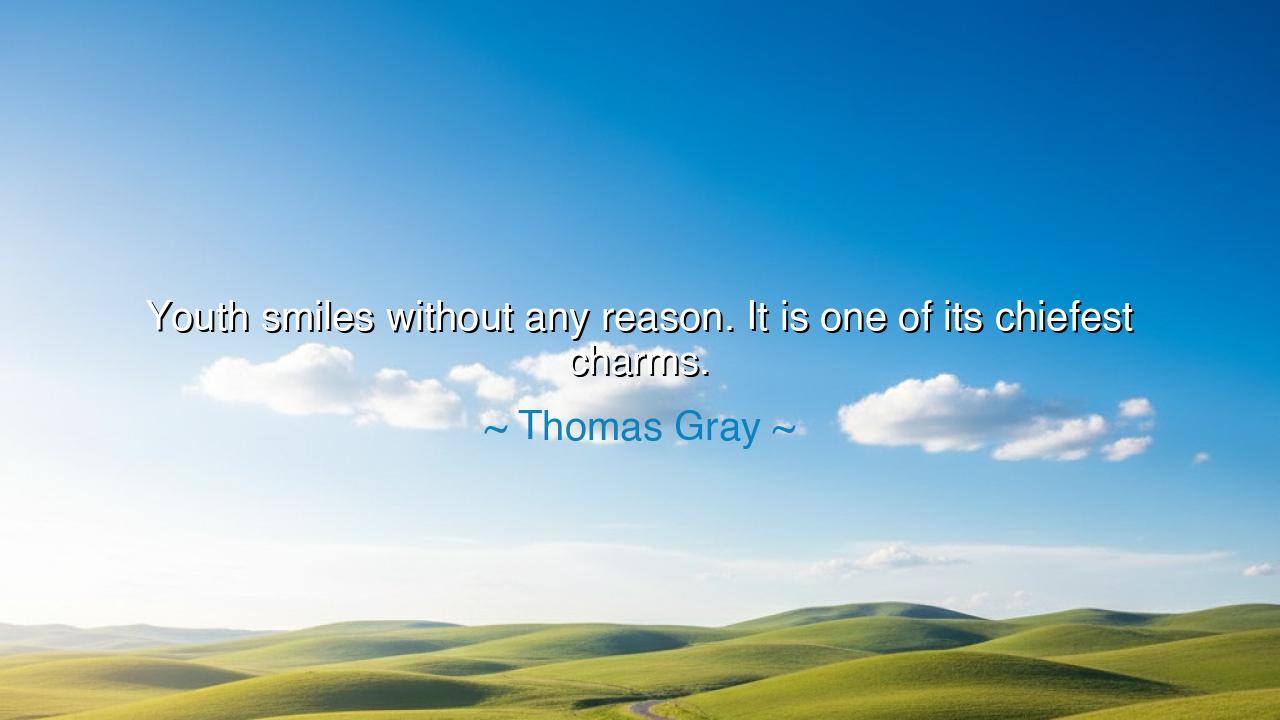
Youth smiles without any reason. It is one of its chiefest






Hear the words of Thomas Gray, poet of elegies and seer of the fleeting nature of life: “Youth smiles without any reason. It is one of its chiefest charms.” In this tender saying, he unveils the innocent radiance of early life, that season when joy flows naturally and effortlessly, before the burdens of the world weigh heavily upon the heart. For in youth, the smile is not born of calculation, nor drawn forth by gain, but springs freely like a fountain from the soul. This spontaneity is its greatest beauty, a charm beyond all adornments.
The ancients often praised the purity of the young. They said that children and the youthful carried within them a spark of the divine, unspoiled by the cunning of age. Their smiles, untainted by guile, reveal the spirit in its most natural form. When a child or youth smiles, the world seems lighter, the air gentler, the heart refreshed. It is as if they carry within themselves a dawn that renews all who behold them. Gray, who wrote often of mortality and the passage of time, saw in the smile of youth a fleeting treasure, something to be cherished before it fades.
Consider the story of Anne Frank, a young girl whose diary became a lantern for humanity. Amid the terror of war and the shadow of persecution, she still wrote with hope, and photographs capture her with a smile that seems impossibly bright for her circumstances. Her youthful smile, though hemmed in by darkness, shone as if from another world. It required no reason, for it was her nature; and in that smile, the world glimpsed courage, innocence, and beauty that even cruelty could not extinguish. Truly, it was one of the chiefest charms of her brief life, and of her lasting legacy.
History also recalls the boy-soldiers of the Great War, who, though barely men, entered the trenches with songs and smiles. They did not yet know the full weight of death, and their lightness, though tragic, revealed the same truth Gray spoke of: that youth smiles without reason, not because it is foolish, but because it is not yet bound by the chains of fear and sorrow. That radiant hopefulness, even in the face of hardship, inspired those older and wearier than they. It was a charm, fragile but powerful, that lifted entire battalions and kept despair at bay.
The meaning of Gray’s words is clear: the beauty of youth lies not merely in strength or vitality, but in the unbidden joy that flows naturally from it. Age often learns to smile only when there is cause—after success, after comfort, after security. But the young smile simply because they live, because the world is new, because hope has not yet been darkened. This is their glory, and it reminds all generations of the divine gift of innocence.
The lesson is twofold. To the young, treasure your spontaneous smiles, for they are your greatest wealth, and you do not yet know how rare they will become. To the old, do not scorn the smile without reason, but learn from it; seek to recover it in gratitude, simplicity, and wonder. For while age brings wisdom, it too often robs the soul of lightness. Let the young teach the old that joy is not always earned—it can simply be embraced.
Practical action flows from this truth. Parents, cherish the smiles of your children, for they are fleeting blossoms that will not remain forever. Adults, allow yourselves to smile without reason—to rejoice in a bird’s song, a sunrise, the mere act of breathing. Teach yourself again the sacred art of joy that asks for nothing in return. And when you see a youth smiling without cause, do not dismiss it as folly, but receive it as a reminder of what life can be when the heart is unburdened.
Thus let Gray’s words endure: “Youth smiles without any reason. It is one of its chiefest charms.” For in this truth we are reminded that the beauty of life is not only found in great victories or solemn wisdom, but in the simple, unearned joy that flows from innocence. The smile of youth is a dawn for the weary world, a light more precious than gold, and a charm more lasting than monuments of stone.






AAdministratorAdministrator
Welcome, honored guests. Please leave a comment, we will respond soon